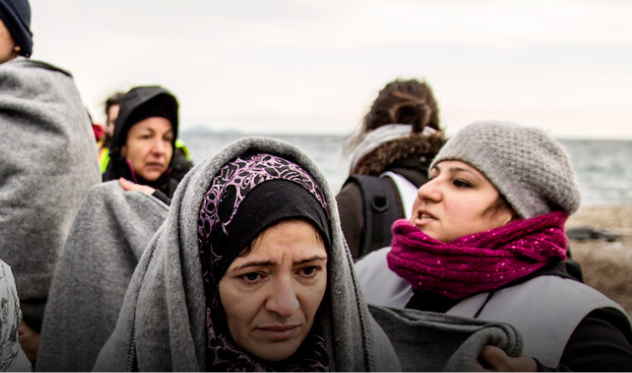A pathway to ending the scourge of statelessness
Azizbek Ashurov knows first-hand the problem of statelessness, but the winner of this year’s UNHCR Nansen Refugee Award argues there is a solution to the problem

Your support helps us to tell the story
From reproductive rights to climate change to Big Tech, The Independent is on the ground when the story is developing. Whether it's investigating the financials of Elon Musk's pro-Trump PAC or producing our latest documentary, 'The A Word', which shines a light on the American women fighting for reproductive rights, we know how important it is to parse out the facts from the messaging.
At such a critical moment in US history, we need reporters on the ground. Your donation allows us to keep sending journalists to speak to both sides of the story.
The Independent is trusted by Americans across the entire political spectrum. And unlike many other quality news outlets, we choose not to lock Americans out of our reporting and analysis with paywalls. We believe quality journalism should be available to everyone, paid for by those who can afford it.
Your support makes all the difference.When I was young, I grew up in a world seemingly without borders. Central Asia was part of the Soviet Union and we could move freely across the region. Nationality and citizenship were things we all took for granted.
With the end of the USSR, though, everything changed for us. The end of such a large political union brought new states, new borders and different laws.
At that time, my family was living in what is now Uzbekistan. But we wanted to move closer to our relatives in Kyrgyzstan.
As soon as we arrived, we were introduced to the new world of an emerging state; paperwork and bureaucracy appeared that had never been there before. I was training to be a lawyer, had proof of my birth and residency but had a hard time establishing my right to Kyrgyz nationality.
Hundreds of thousands of people across Central Asia weren’t as lucky as me and became stateless, almost overnight. Old Soviet passports became invalid and many people realised they could not prove where they were born, meaning they could not claim the right to be a national of one of the new states in the region.
Being stateless sounds like a dull bureaucratic term but its effects can be devastating. As a citizen of nowhere, you don’t have the right to participate in the society you live in. You cannot go to school, work, legally marry, access healthcare or travel freely. Things that most of us take for granted.
Your lack of documentation makes you afraid of the authorities so you don’t report crimes against you and are not allowed to apply for the social benefits that documented citizens receive. You might live in a country, but as far as that country is concerned, you don’t exist.
Women were particularly affected when they married and settled outside of their own area to live with their husband’s family. Many did not register themselves or their marriage in their new country as this had never been necessary before. In Kyrgyzstan, many stateless women had come from neighbouring countries and were not able to visit family members for years because they did not have travel documents allowing them to return.
When they turned to the authorities, the officials did not know what to do. They were not familiar with the problem and would send people around in circles, from one state institution to the next. Their children would inherit their statelessness and the cycle would continue.
In 2003, I was among a group of lawyers who offered free legal advice in the south of Kyrgyzstan around the city of Osh. We are called the Ferghana Valley Lawyers Without Borders and I have been its Director for the past 15 years. The valley spans Kyrgyzstan, Tajikistan and Uzbekistan, and people from similar cultural groups live on all sides of the borders.
We soon had more and more people coming to see us with nationality problems, and from 2007 we began to really focus on statelessness.
We worked with the Government to change laws, grant amnesties and then, from 2014, set out across the country to find every person without a nationality to help them obtain the documents to give them what was always theirs: the right to be Kyrgyz.
We travelled in old 4x4 Ladas and on horseback to reach people in most remote corners of the country and worked hard to gain the trust of traditional nomadic groups to help them receive documents and become citizens of the country.
From 2014 onwards, over 13,000 people gained nationality and in July of this year the Kyrgyz Republic was recognised as the first country in the world to end statelessness.
It was a truly national effort. We couldn’t have succeeded without the strong backing of the Government and support from throughout the country.
It is an honour to receive this year’s Nansen Refugee Award from UNHCR, the UN Refugee Agency. But it is not about me. It is an award for all the people who have devoted themselves to changing the lives of stateless people worldwide. It is of great symbolic value that for the first time in the 65 year history of this prize, it is awarded for work on ending statelessness.
This also an award for the entire country of Kyrgyzstan, to which I proudly belong.
As millions of people all around the world live with the terrible effects of statelessness, the lessons we can draw from our work in Kyrgyzstan are clear. We can end statelessness. It is possible.
Azizbek Ashurov is the 2019 winner of UNHCR’s Nansen Refugee Award, which honours individuals, groups and organisations who go above and beyond the call of duty to protect refugees, displaced and stateless people.
Join our commenting forum
Join thought-provoking conversations, follow other Independent readers and see their replies
Comments